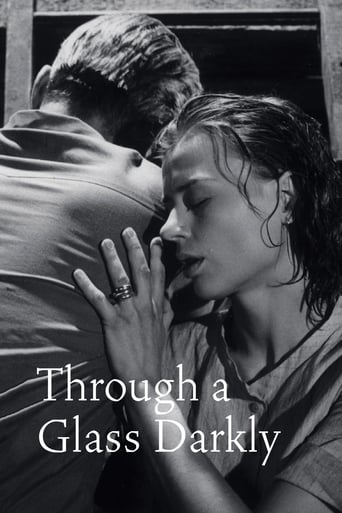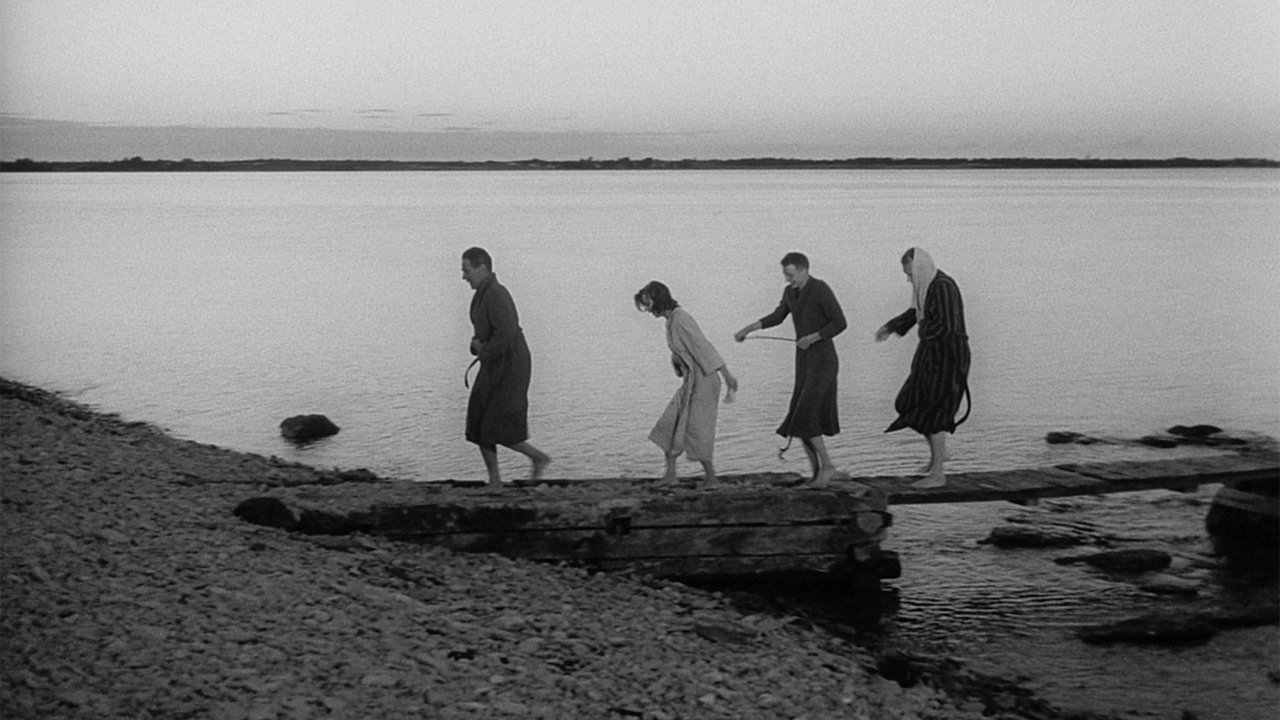Nigel P
Karin (Harriet Andersson) has recently been released from an asylum having undergone electroconvulsive therapy. She returns to her isolated family home and rejoins her father, writer David (Gunnar Björnstrand), teenage brother Minus (Lars Passgård) and husband Martin (Max von Sydow), with whom she has an awkward sexual relationship. In fact, she seems more flirtatious with Minus, who is confused by his feelings for her. Unable to sleep one night, she finds and reads David's notes about her 'incurable' condition, and his desire to record her 'disintegration.'This is a Swedish film directed by Ingmar Bergman in bitingly bleak black and white. The only cast are the four characters, and the only setting is their remote island home, which Bergman manages to make both idyllic and claustrophobic at the same time. Karin's decline is slow, and she is lucid enough to be tortured by it.Also tortured of course, are those around her. There is an impotence about Karin's family, as quite clearly they do not know how to handle the prospect of her instability - but in the case of David, has his detachment contributed to Karin's inability to relate to her own husband? Or has she always been unreachable? We never know, despite the very talky nature of the production (and the English subtitles). The fact that Karin's condition seems to be the reason Minus and his father finally grow close is scant reason for celebration.People are flawed.A very intense, open-ended study in human behaviour.
Antonius Block
Harriett Andersson really shows her range as an actress in this film from Director Ingmar Bergman, playing a young woman recently released from a mental institution, and suffering from schizophrenia. She seems so natural and effortless as she toys with her younger brother (Lars Passgård), poignant as she rues what she's done to her husband (Max von Sydow), and explosive in front of him and her father (Gunnar Björnstrand) as she breaks down. It's a fantastic performance. Those are the only four actors in the film, which is stark and minimalistic, set on an island vacation home and taking place over a single day. It's a quiet, thoughtful movie, where each scene and each shot seem like a work of art. There are frustrations all around: Björnstrand is an author who struggles to the point of despair with writing something that is good artistically, and also with ensuring he spends enough time with his family, unfortunately erring too much on the side of his writing instead. Passgård feels this acutely, yearning for his father's attention, and also having difficulty with his emerging sexual desires. von Sydow has the frustration of losing his partner, as her sanity and her affection have faded, and he knows he is powerless to help against a condition which will never improve. He continues to love her anyway. The main axes of the movie have Andersson (schizophrenic) inflicting pain on von Sydow (her husband); Björnstrand (callous and selfish) inflicting pain on Passgård (his son). It's telling that Andersson has her breaks with reality in a dilapidated old room, and then later in a ship that's wrecked along the shore as water pours in. There is a sexual element here: she denies her husband, and later suggests that this is because she must choose "one side or the other", seeming to have opted for the crazy and unreal side of her psyche, having some sort of sexual encounter in her mind in the room before he wakes up, later seducing her brother, and finally sees God as a spider intent on penetrating her. Amidst of their frustrations, the characters struggle to find meaning. As with other Bergman movies, the deeper questions about life and God are present. It's amazing that he packs this all into such a tight and lean story, with four characters over a single day. He makes use of reflections and light more effectively than anyone – watch for this throughout the movie. The opening and ending scenes are especially meaningful in light of its themes – inner reflection on one's demons, what the people around us mean to us, and whether God exists. There is no easy answer to that last one. von Sydow is cynical and Andersson has a sort of mystical faith until it's disillusioned by the spider imagery. In a beautiful scene at the end, however, Björnstrand says it may exist in the love people show for one another. At the very least, he knows that love exists, and that it helps us in our difficult, meaningless lives. Through all the darkness and difficulty, and though we cannot perceive meaning, looking as we do, "through the glass darkly", there is hope in love. Great film.
Andres Salama
This "chamber film" by Ingmar Bergman (whose name is a quote in the Christian bible) has just four characters: a writer (Gunnar Bjornstrand), his schizophrenic daughter Karin (Harriet Andersson), Karin's husband, Martin (Max von Sydow) and Karin's teenage brother, Minus (Lars Passgard). With the exception of Passgard, all the other three are Bergman regulars, having appeared in many of his films.The movie happens in a single day period in an isolated island, and it's basically about how Karin goes from being relatively normal at the beginning to absolutely crazy 24 hours later, and the reaction of the three people around her. The Bjornstrand character, for instance, feels guilty about his daughter madness, though we now know that upbringing has little influence on mental illness. Also, her descent into madness is so rapid during the movie (though we are told that she has been in a mental institution before) that perhaps is not very believable. Also hard to accept are the solemn lines the characters spout about the "silence of God". Of course, many people have thoughts about existential issues like this, they just don't talk about them in such solemn manner. Of all the major directors Bergman was the one whose background in the theater was more obvious. In some of his movies, like this one, this stage background makes a little more of "noise".So this is a worthwhile film, but not in my opinion among Bergman's best: At about the same time he did with Bjornstrand Winter Light which is somewhat lesser known, perhaps, but far better.
ElMaruecan82
As usual with Ingmar Bergman's movies, the power of imagery, its meticulous attention on shadows and lightning have such an effect on eyes, a second viewing becomes an absolute necessity for the distracted mind, and the second effect is so mind-blowing, any use of words becomes pointless.Words and images, light and darkness, harmony lies in pair in Bergman's films and "Through a Glass Darkly" is no exception. The pairing pattern works for faces as the film rarely shows one person in the screen, always two. Four major protagonists are always interacting in pairs. We draw our personal circle, says David (Gunnar Björnstrand) to his young daughter Karyn (Harriett Anderson) in order to protect ourselves from the others' secret games, and when life breaks the circle, as a defensive mechanism, we build another one. Life is made of round-trips between illusion and reality.In an earlier scene, David is confronted to Martin, Karen's husband, played by Max Von Sydow. He told him that Karyn checked into his diary and found out his secret thoughts about her disease. Although never revealed, it's clearly implied that she suffers from schizophrenia, and they're all resting in Faro Island after she spent some time in a mental hospital. Karyn is normal on the surface, but her child-like behavior while she teases her younger brother Minus (Lars Passgård) arises our suspicions. She then explains that her hearing got more accurate, she's awaken up by noises of birds and animal, and is even capable to hear some voices speaking to her from a wallpaper and announcing the arrival of God. Karyn's life, so far, feels like a one-way ticket to a world of illusions.And according to Martin, Karyn's disease is 'relatively incurable'. What is 'relatively'? Is it a light of hope, a euphemism or God having pity of one of HIS firmest believers? Anyway, David only reacts as a writer; he sees an opportunity to fill his mental block, which Martin explicitly condemns. David can barely hide is guilt and his reactions sound like admittance. It's simply amazing how a simple conversation put answers to all the interrogation left in the set-up. Why is David so estranged to his family? Why, after a long trip to Switzerland, he plans another world-traveling period? It might be part of his situation as a successful author, but it doesn't fool anyone, these travels are his escape from reality. According to his personal vision, David drew his personal circle from his reluctance to face the reality of his daughter's sickness, of his boy's unease with the adult world. On the other hand, Martin, is the most compassionate and disinterested protagonist, although Karyn can't bring him sex and happiness, he loves her, and tries desperately to reach her, while witnessing the disintegration of her mental state. David, however, asks him whether he can control his inner feelings, to which Martin retorts that he's too simple and human for that. Is he? Wouldn't he secretly wish for her wife to die in peace, and put an end to a pointless anguish, and wish what would be more of an act of mercy from God?Bergman's started his 'chamber' trilogy with a film whose themes echo his eternal torments, not existential on a personal but on a binary level, how can two people understand each other's condition, how can one break the other's circle? But this is not a philosophizing film, for the simple reason that it is a film and film is an art of imagery and emotions. Bergman, a natural-born playwright, uses a family island, some rooms and an attic as the setting of people's torments. Examine some crucial scenes, two faces are on the screen, looking in different directions, both lit by lights from different sources, as if the source of one's truth was a secret impossible to reach.This device, from the cinematographer and genius Sven Nykvist would culminate with the iconic shots of Bibi Anderson and Liv Ullman half-faces forming one in "Persona". But if "Persona" showed that the line between two souls could be opened, it's this impenetrability that shows in "Through a Glass Darkly". And the narrative is mostly pessimistic on Karyn's case, she's not trapped in a circle, but has a foot in reality, and one in the 'other' one, from which some voices whisper and announce her the imminent intervention of God. This is perhaps one of the greatest enigmas that tormented Bergman, the filmmaker, the existence of God, and the alienating effect of the intellectual and emotional efforts to reach him. Maybe the secret is to find God within the world you exist in, rather than the outside world. Again, as painful and troubling as life is, it's still life. The movie ends with a heart-to-heart discussion between David and his son, both trying to find out the roots of salvation, how to get accommodated with reality. Maybe the essence of life is love, and this is where God must be found out. Love in the broadest meanings, from a brother, a father, a lover or a husband
it's all about approaching our vision of love. There are many interrogations left, notably a controversial moment between Karyn and Minus with many incestuous undertones. Maybe this was another misguided attempt to find love, in the most awkward way, something so unexplainable that even the Master explored it carefully, leaving up to us to see "through the glass", the magic class of his camera.One night, my wife wanted to play to a game of impossible choices. She asked me: what if I had the choice between fulfilling all my dreams, becoming an acclaimed and distinguished filmmaker but losing her love. Like in a Bergman film, my silence said so many words that no answer mattered anymore. I knew how David during that crucial boat ride
and this is how genuinely expert on human's deepest complexities, Ingmar Bergman is, on a universal level.


 AD
AD




